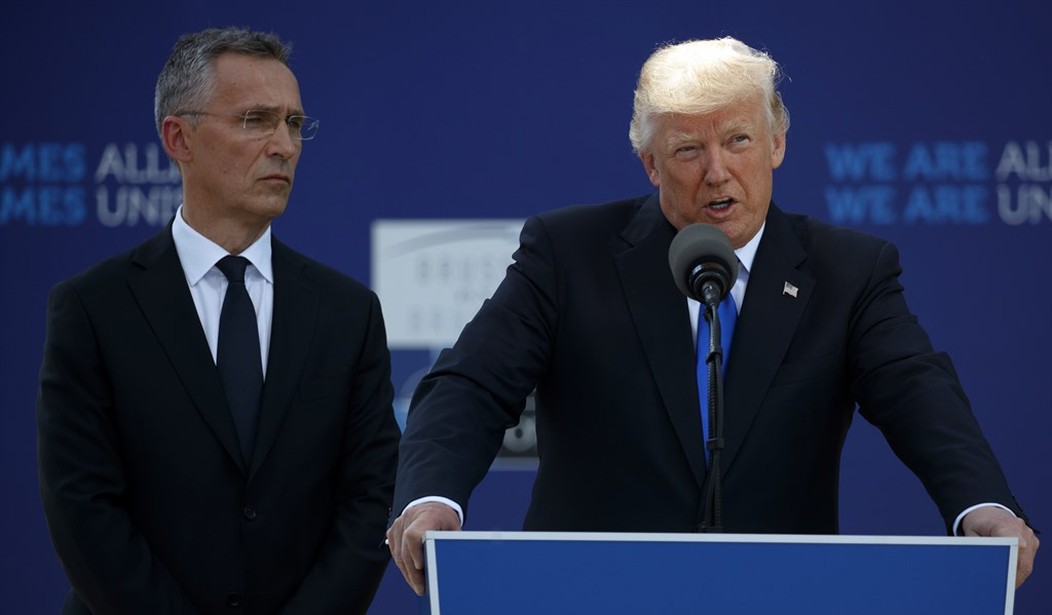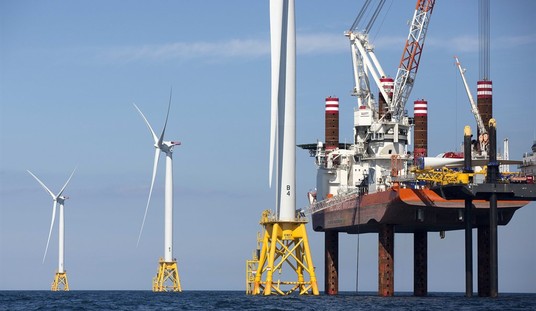Don’t blame us for undercutting NATO, White House leakers have begun urging after Donald Trump’s only substantial misstep on his maiden foreign trip as president. According to three unnamed sources inside the Trump administration speaking to Politico’s Susan Glasser, the glaring omission of a defense of Article V in Trump’s speech to NATO at the end of his trip surprised everyone on his team. Until he began speaking, Trump’s national security team — including top adviser H.R. McMaster — thought he would deliver that endorsement of the mutual-defense clause that serves as NATO’s best deterrent:
What’s not is that the president also disappointed—and surprised—his own top national security officials by failing to include the language reaffirming the so-called Article 5 provision in his speech. National Security Adviser H.R. McMaster, Defense Secretary Jim Mattis and Secretary of State Rex Tillerson all supported Trump doing so and had worked in the weeks leading up to the trip to make sure it was included in the speech, according to five sources familiar with the episode. They thought it was, and a White House aide even told the New York Times the day before the line was definitely included.
It was not until the next day, Thursday, May 25, when Trump started talking at an opening ceremony for NATO’s new Brussels headquarters, that the president’s national security team realized their boss had made a decision with major consequences – without consulting or even informing them in advance of the change.
“They had the right speech and it was cleared through McMaster,” said a source briefed by National Security Council officials in the immediate aftermath of the NATO meeting. “As late as that same morning, it was the right one.”
Added a senior White House official, “There was a fully coordinated other speech everybody else had worked on”—and it wasn’t the one Trump gave. “They didn’t know it had been removed,” said a third source of the Trump national security officials on hand for the ceremony. “It was only upon delivery.”
McMaster later tried to make the best of it, insisting that any explicit endorsement was unnecessary. He also insisted that Trump’s presence at the NATO event was a commitment to the whole organization and treaty, including Article V:
“I think it’s extraordinary that there would be an expectation that the president would have to say explicitly that he supports Article 5. Of course he does,” McMaster told reporters at the end of a Group of Seven summit in Sicily.
“He did not make a decision not to say it,” McMaster continued. “It was implicit in the speech. There was no decision to not put it in there. It is a matter of fact that the United States, the president, stands firmly behind our Article 5 commitments under NATO.”
Perhaps that might be true of most American presidents, but most American presidents didn’t openly question the utility of NATO to American security during their campaigns, either. For instance, George W. Bush didn’t mention Article V in his 2004 speech to the NATO summit in Istanbul. But then again, the context of Bush’s speech also made that unnecessary, as he hailed the cooperation from NATO in Afghanistan and in the broader war on terror:
Some on both sides of the Atlantic have questioned whether the NATO alliance still has a great purpose. To find that purpose, they only need to open their eyes. The dangers are in plain sight. The only question is whether we will confront them, or look away and pay a terrible cost.
Over the last few years, NATO has made its decision. Our alliance is restructuring to oppose threat that arise beyond the borders of Europe. NATO is providing security in Afghanistan. NATO has agreed to help train the security forces of a sovereign Iraq, which is a great advantage and crucial success for the Iraqi people. And in Istanbul we have dedicated ourselves to the advance of reform in the broader Middle East, because all people deserve a just government, and because terror is not the tool of the free. Through decades of the Cold War, our great alliance of liberty never failed in its duties, and we are rising to our duties once again.
The US leveraged Article V for our own purposes in Afghanistan, building a large multinational coalition to take down al-Qaeda and the Taliban who sheltered Osama bin Laden before, during, and after the 9/11 attacks. The centrality of Article V was a lot more obvious at that point, and hardly required mentioning. Ten years later, Barack Obama would explicitly cite Article V in leveraging NATO in the context of renewed Russian expansionism:
After more than a decade, NATO’s combat mission in Afghanistan is coming to an end. Russia’s aggression against Ukraine threatens our vision of a Europe that is whole, free and at peace. In the Middle East, the terrorist threat from ISIL poses a growing danger. Here at this summit, our Alliance has summoned the will, the resources and the capabilities to meet all of these challenges.
First and foremost, we have reaffirmed the central mission of the Alliance. Article 5 enshrines our solemn duty to each other — “an armed attack against one…shall be considered an attack against them all.” This is a binding, treaty obligation. It is non-negotiable. And here in Wales, we’ve left absolutely no doubt — we will defend every Ally.
Our NATO allies expected to hear a similar commitment from Trump at the NATO summit. If Politico’s sources are correct, so did Trump’s own nat-sec team. And the reason why is that Trump’s campaign rhetoric had already called that commitment into question. His speech at NATO, with its (justified) complaints about financial commitments from our allies and a lack of explicit mention of Article V, gives the impression that we’re going to take that on a case-by-case basis. That is a very dangerous signal to send, with Russia promoting ethnic restiveness on its borders with the Baltic states, and with Putin on a roll after Crimea and Ukraine.
There was much to cheer on Trump’s first presidential trip, but a lack of public commitment to Article V was a serious mistake — but it’s fixable. It’s not enough for McMaster to say Trump supports the common-defense clause on the down-low, because if the time comes to commit troops to a common defense, it won’t be McMaster who gives the order. Trump needs to schedule a speech soon in which he makes a much more explicit commitment to Article V, before the ambiguity tempts other powers to test the US on this point.








Join the conversation as a VIP Member